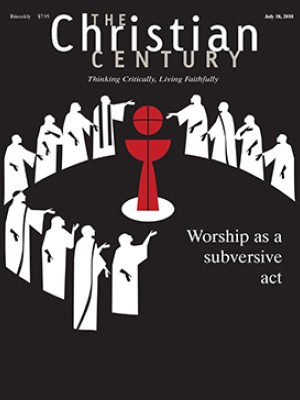August 12, Ordinary 19B (John 6:35, 41-51)
People must have gasped when Jesus opened his mouth and said 'I am.'
On the first page of her book Prague Winter, Madeleine Albright writes:
I was fifty-nine when I began serving as U.S. secretary of state. I thought by then that I knew all there was to know about my past, who “my people” were, and the history of my native land. . . . Only I didn’t. I had no idea that my family heritage was Jewish or that more than twenty of my relatives had died in the Holocaust. I had been brought up to believe in a history of my Czechoslovak homeland that was less tangled and more straightforward than the reality.
She began to learn about the family and the history she thought she knew after she became a public figure, when people began to write her and tell her stories about her grandparents and parents. The dates and names were accurate, so she began a quest. The book is a result of what she learned.
Read our latest issue or browse back issues.
We overhearers of the fourth Gospel have been at least partially aware of who Jesus was—and is and will be—since page one. That opening hymn told us a lot about the Logos, about his unity with God, his sent-ness from God, and more. When he engages his first disciples and wades into the crowds, however, he doesn’t trot out that hymn. Not one of them is privy to our outsider information (two millennia removed, not to mention language and cultural differences), which is also curiously insider information (that first chapter). They have to learn about him gradually, from what he says and what he does, from how he deals with the riffraff and the muckety-mucks.
And learn they do, as he gathers momentum teaching and preaching and healing. They learn that he’s a mensch who genuinely cares for people and their needs. They’ve also seen him do rather extraordinary things, like the water turned to wine back at Cana or the feeding of the multitude earlier in this chapter—displays of power they don’t see every day, not even from his contemporary wonder-workers. But mixed with their growing awareness of who he is are their assumptions that they already know the answer: Isn’t he from Nazareth, and don’t we know his folks?
Jesus, however, is not content with the adulation that comes with magic tricks, nor does he wish for the people to be misled by their assumptions. He wants them to understand more deeply who he is and by that understanding, come to believe. Thus, the famous “I am” statements peculiar to this Gospel, and so disturbing to some. “I am” is a faithful translation of the Greek ego eimi. But the Greek, standing in an earlier Hebrew tradition, is much more than a simple self-identification. When Jesus says “I am,” even before he follows the phrase with a predicate nominative, there are gasps from certain members of his audience.
This hearkens back to the mysterious self-identification of God to Moses in Exodus 3. Moses, you will remember, is not at all thrilled with the job he’s being called to do. Who is he to take on such an onerous responsibility—and more to the point, who is the one who is calling? To the second protest, God responds ehyeh asher ehyeh, a simple Hebrew clause that is notoriously difficult to translate. While the traditional rendering “I am who am” gets at the sense of it, there are other ways to render it faithfully. It’s the basis for Paul Tillich’s and others’ description of God as the “ground of being,” and to a certain extent it undergirds the Thomistic “uncaused cause” description of God. In Jesus’ day and culture, the God of Israel was understood to be the font of being, being itself. So for Jesus to identify himself beginning with that phrase must have been something of a shock.
What’s more, both Hebrew and Greek are more highly inflected than English. The subject of a verb is already present in the spelling of the verbal form; one doesn’t need an accompanying nominative noun or pronoun to identify the subject. Had he simply said eimi (“am,” first-person nominative singular), his utterance might not have occasioned the ensuing gasps. That he added the ego (“I”), giving the subject (and therefore himself) special emphasis, might simply have been too much for some of his listeners.
Each “I am” statement invites Jesus’ audience into a fuller understanding of him and his ministry, and along the way he is reinterpreting and expanding—not denigrating—the earlier tradition. In his “I am the bread of life” statement, Jesus is claiming that as wonderful and life-giving as the manna once was, this second gift of bread from heaven—himself—is even more beneficial, even more life-giving.
The author of the fourth Gospel is cunningly stirring up memories dear to the heart of the crowd around Jesus. The exodus event is front and center, with the talk of manna and its whiff of liberation—a welcome recollection for a community living under the thumb of a new pharaoh. But he is also calling upon the prophetic tradition. He’s resting on Isaiah 55, with its question, “Why do you spend your money for that which is not bread, and your labor for that which does not satisfy?” That familiar passage ends with the divine promise of sending “my word [which] shall not return to me empty” (55:11)—a point not lost on our writer, who began his Gospel by describing the Word.






